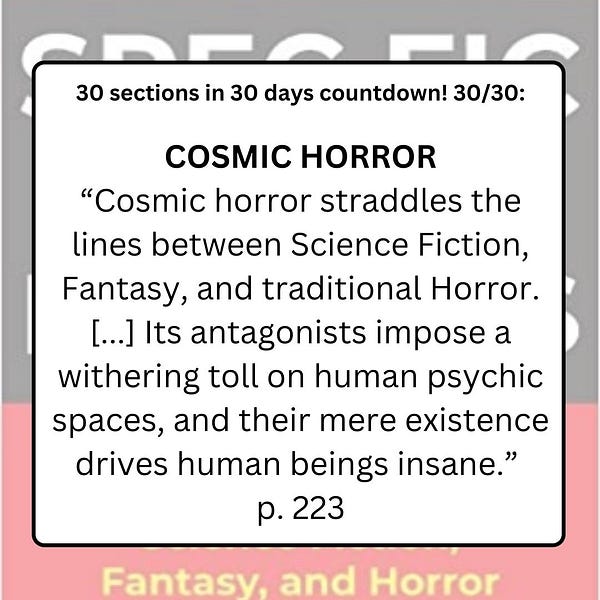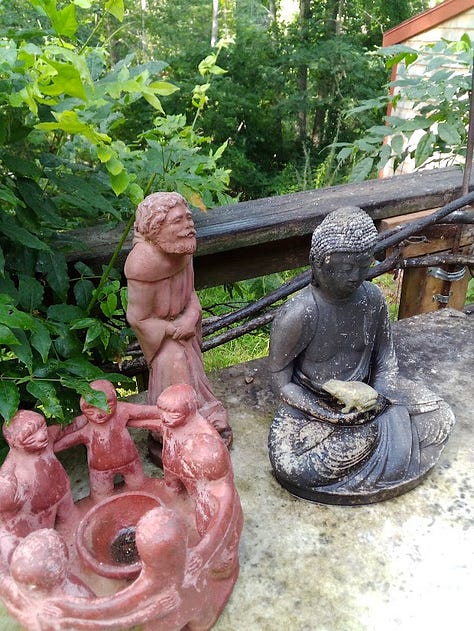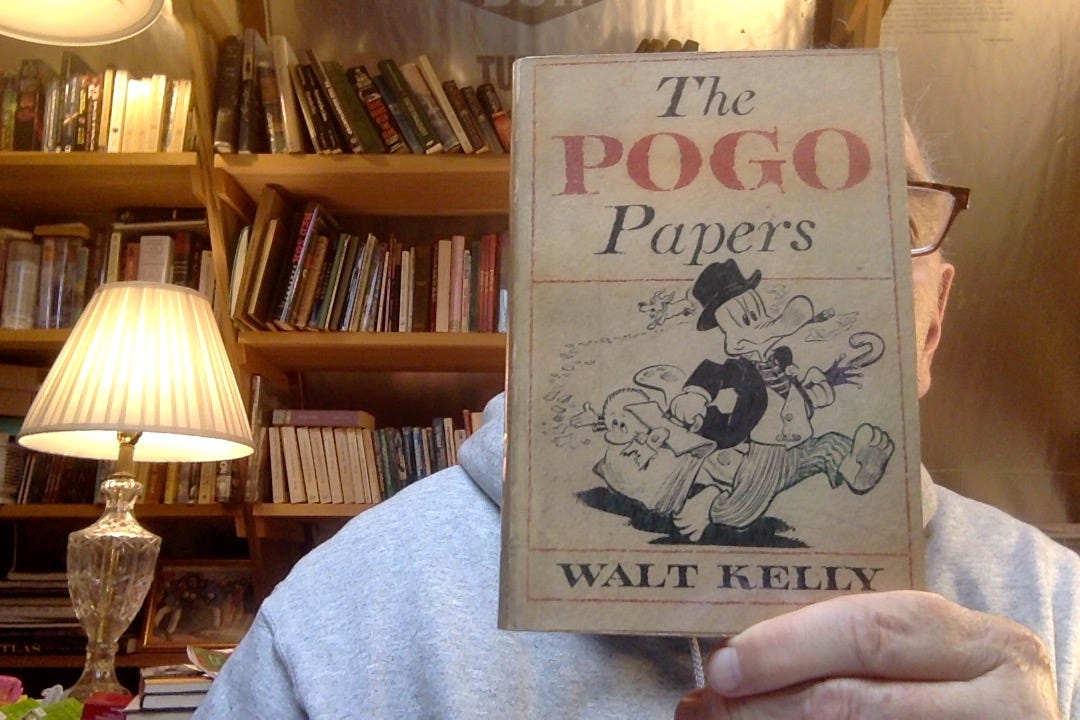A Scared Firefighter up in the Bucket, part three
What he was afraid of then. What he's afraid of now.
Trying to keep up
This essay is the conclusion to my Scared firefighter up in the bucket thread which started out ostensibly being about the only time I ever got scared during my ten year firefighting career but which kind of mutated into a bunch of digressions on the philosophy of mind, the history of AI chatbots, recollections of a dinner party featuring Douglas Hofstadter and Daniel Dennett, and the wonders of the seasonal garden my wife creates anew each year on our back porch. Part three of this essay may make a bit more sense if you’ve read either or both or part one and/or part two.



Since I started this little sequence a few weeks ago the phenomenon of generative pre-trained transformer AI chat engines, also known as large language models, ‘LLMs’ has gone from something that computer scientists and geeks were talking about amongst ourselves to front-page news. Among other things, we’ve seen: U.S. Senators saying that these new technologies pose threats to our economy and national security; an open letter signed by AI experts calling for a moratorium; a backlash to that open letter, and new new mind-boggling AI applications appearing seemingly every day.
Every time I think I know what I want to say about all this stuff some other big AI news drops. It’s made me feel like the Red Queen, running flat out just to stay in the same place.
A breakthrough at the scene of the fire
So, anyway, about that fire.
When I was ten years old I was obsessed with the Pogo comics by Walt Kelly. Which, if you’re not familiar with Pogo, it is my sad duty to inform you that you have a big hole in your education, which I suggest you address with all due dispatch.
One of Kelly’s many running gags concerned the hapless volunteer fire department of the Okefenokee Swamp. They’d show up from time to time, apropos of nothing in particular, doing something that had nothing to do with firefighting, with the littlest one always adding “I carry the hose.” Here’s how that gag ended:
Well, something similar happened at that house fire I’ve been telling you about. Murphy was directing the master stream from the Bronto’s water cannon into the house through that dormer window, with good effect, when, unbeknownst to us the jet of water broke through the fire-weakened roof on the other side of the attic and bowled over two firefighters and one assistant chief on the rear side of the building.

Now, not only is it no fun to get knocked over by a stream of water coming at you at the rate of eleven hundred gallons per second, if you’ve read the earlier installments of this narrative you’ll recall that the guys attacking the fire from the rear of the house were already dealing with a thicket of underbrush and a live electrical wire. So knocking them over like bowling pins was not an optimal development on the fire ground.
When Assistant Chief Joey came on the radio to inform us of this mishap, believe me, he was not in a good mood about it. We’ll come back to this.
Varieties of AI-genic Existential Dread
I said in part one that developments in AIs that appear to out-human us humans can inculcate in susceptible psyches a kind of existential dread. Looking more closely at this phenomenon we can see that this AI-genic dread can be further broken down into two subtypes, which I’ll call Airplanian Dread and Skynettian Dread.
Airplanian Dread
I use Airplanian alluding to Jefferson Airplane, in particular their song ‘Crown of Creation,’ from the album Crown of Creation. The apparent subject of this song is the disorienting feeling you get when all of your assumptions about your place in the universe have been blasted to smithereens. That is to say, if ChatGPT and its kin can do all the most human things better than we can, then, perhaps, our specialness is gone, we're no longer the crown of creation.
You are the crown of creation You are the crown of creation And you've got no place to go
This is reminiscent of the Copernican Revolution, when humans had to come to terms with the notion that they were not the center of the universe. As you may recall, that notion did no go down easily everywhere.
Soon You'll attain the stability you strive for In the only way that it's granted In a place among the fossils of our time
Another name for this phenomenon of Airplanian dread might be cosmic horror:


Further, if new kinds of superior intelligences really are appearing on earth, does it raise the question, perhaps, some kind of competition between us and them? In the Airplane’s words,
In loyalty to their kind They cannot tolerate our minds In loyalty to our kind We cannot tolerate their obstruction!
Whatever you may think of this notion, ‘Crown of Creation’ is a great song with an interesting origin story and you should go listen to it.
Skynettian Dread
This kind of dread, of course, refers to Skynet of the Terminator film franchise. Skynet, the human-created AI that becomes uncontrollable and decides to wipe humanity off the face of the earth. We get an inkling of that flavor of dread in this tweet from a U.S. Senator:

Although Skynettian dread has been a staple of science fiction for nearly a hundred years, it has long been dismissed as silly superstition by technophiles and people who consider themselves generally enlightened. But that may be changing. Check out this short thread:


The Turing Award, by the way, is the so-called "Nobel Prize of Computing". So that’s all I have to say about that for now, other than, if you want to read a dispassionate and informed take on these issues, I recommend: (1) the new substack Dodging Waluigi by Robert Thau, (2) Gary Marcus,
and (3) the always insightful Cory Doctorow. Cory’s take is that we’re going overboard with all this AI hype.
And Now a Brief Word from our Sponsor
Speaking of Cory Doctorow, let me remind you that he will be writing an introduction to the forthcoming re-issue of my nano-bio hackertastic novel Acts of the Apostles (part of a set of re-issued Sundman novels, each with a new introduction by a noted authors (Acts: Doctorow; Biodigital: John Biggs; The Pains: Ken MacLeod, Cheap Complex Devices: David Weinberger) that can be yours, each autographed by me, if you become a founding subscriber to Sundman Figures it out!.



Cheap Complex Devices, Hofstadter & I
And now as this little post staggers towards some kind of conclusion we arrive at my 2002 novella Cheap Complex Devices. That’s where this Scared Firefighter up in the Bucket story properly begins. Because if I had not written Cheap Complex Devices — which purports to be a report on the inaugural “Hofstadter Prize for Machine-Written Narrative” about a storytelling competition between two AIs — I wouldn’t have been asked by an editor at Salon to write that Loebner story in the first place. And that Salon/Loebner story was responsible for me getting invited to dinner with Hofstadter & Dennett which I recalled at the precise moment when I saw something up in the bucket that gave me such a horrible fright.
By the way, that title, Cheap Complex Devices, comes from a phrase buried deep within Vannevar Bush’s 1945 clairvoyant essay ‘As We May Think’:
The world has arrived at an age of cheap complex devices of great reliability; and something is bound to come of it.
My book, my hommage à Hofstadter, ( which Hofstadter himself has never read — though he did once spend 45 minutes explaining to me why he didn’t have time to read it) was clairvoyant too, in its own way.
Although Doug Hofstadter has not read Cheap Complex Devices, the bestselling novelist Nicole Galland has. A 44-second clip:
After the Fire
So, we (Tisbury Fire Department and friends) put out the fire. The sun came up and we went back to the firehouse to recombobulate our equipment to get everything ‘mission ready’ for whenever the next alarm might sound. I remember the exhilaration of riding my bike down State Road to the old firehouse wearing my PJ’s and sneakers and my bunker jacket & helmet.
We refueled vehicles, washed off the dirty hoses and folded them them in their hosebeds, refilled air bottles, repacked our gear bags. Joey chewed out me Murphy and me for having bowled over the guys at the scene, but the firefighters in question gave me and Murphy high fives: “You knocked Chief right on his ass! It was beautiful!”
Then one of my buddies put my bike in the back of his pickup truck and gave me a ride home.



What I feared that cold morning & what I fear now
So now I’ve told you about responding to that structure fire on that cold October morning in 2011; I’ve told you about the thrill of going up in the bucket and about the dramatic incident of the bowling-over of the firefighters and Joey, the assistant chief, with the master stream from the Bronto’s tower water cannon; I’ve told you about the live electrical wire and I’ve shown you the electrocution hazard warning.
But it turns out that none of these things had anything to do with what I saw as the sun was coming up that so terrified me.
What I saw was ice.
Water had dripped from the Bronto’s water cannon over the hour or so that we had been fighting that fire, and now the steel grate upon which Murphy and I stood was covered in sparkling ice.
As soon as I saw it I remembered that I had promised Betty that I would take all of her plants inside our house to winter-over before the first hard frost came. And I realized, looking at that ice, that a hard frost had now come. But I had put off taking the plants inside. They were all still on the porch. And when I got home I would quite possibly find that they were all dead.
This was the mirror of what happened on the night when I had gone to dinner with Hofstadter and Dennett six years earlier, when I had convinced Betty that the danger of frost had passed and moved all her plants outside in late April. Only to have a hard frost come a few days later while I was out of town dining with philosophers. Betty, home alone, wrestled the plants back inside. Except the ones too big for her to handle. They all died.
Only people who’ve been married to Betty can know that stark terror I felt when I realized I might have done it again.
But when I got home this time I found that the plants were all fine. Betty made a big plate of pancakes for me, and later that day I took the plants inside. So you see? There was nothing to be afraid of.
And what am I afraid of now? I’ll have to tell you about that sometime.




I imagine a dinner with The Hof(stadfter) would result in a sort of thought hangover.
One might treat it with careful doses of Saturday morning cartoons (do such things still exist?).
I'm still working my way through your archives, so apologies if I missed this (or have yet to encounter it), but the mention of cosmic horror tickled my brain into recalling the AI as shoggoth meme that has been around the block a few times:
"In a nutshell, the joke was that in order to prevent A.I. language models from behaving in scary and dangerous ways, A.I. companies have had to train them to act polite and harmless. One popular way to do this is called 'reinforcement learning from human feedback,' or R.L.H.F., a process that involves asking humans to score chatbot responses and feeding those scores back into the A.I. model."
"Most A.I. researchers agree that models trained using R.L.H.F. are better behaved than models without it. But some argue that fine-tuning a language model this way doesn’t actually make the underlying model less weird and inscrutable. In their view, it’s just a flimsy, friendly mask that obscures the mysterious beast underneath."
"@TetraspaceWest, the meme’s creator, told me in a Twitter message that the Shoggoth 'represents something that thinks in a way that humans don’t understand and that’s totally different from the way that humans think.'"
"Comparing an A.I. language model to a Shoggoth, @TetraspaceWest said, wasn’t necessarily implying that it was evil or sentient, just that its true nature might be unknowable."
"'I was also thinking about how Lovecraft’s most powerful entities are dangerous — not because they don’t like humans, but because they’re indifferent and their priorities are totally alien to us and don’t involve humans, which is what I think will be true about possible future powerful A.I.'"
(NYT Gift Link) https://www.nytimes.com/2023/05/30/technology/shoggoth-meme-ai.html?unlocked_article_code=AHkkKMWX5sfr2Ra_rBmg8V1lXAR4qNx0u0MI9yMIoosYuwyxSR622jIDwlbIRuMAn01rwtE30hzia6lbH8Z-gbt6-BD_mvDnukhNA_7-_TESvJ6aJZwLgzSnvrirLQjdOTpvGMhkWrjRXiBHuCjevErFvW4_Sns9yd8MrcEGpnqurxLSSOlVuZRvj_wb_mYaWZq9Mf3CyRqoM_NIVGHJ7-JsQJrlT4OdDS6ulwbgm1_wOhiT6dagveXzZapWwKlGDycddRqhA_RJYZkpG7AtxmizbE9jEZj9hnQpNwl6X90ITEA4-bkV8jR62wtoqulzcIANQaKhCAxY0fFjkg&smid=url-share